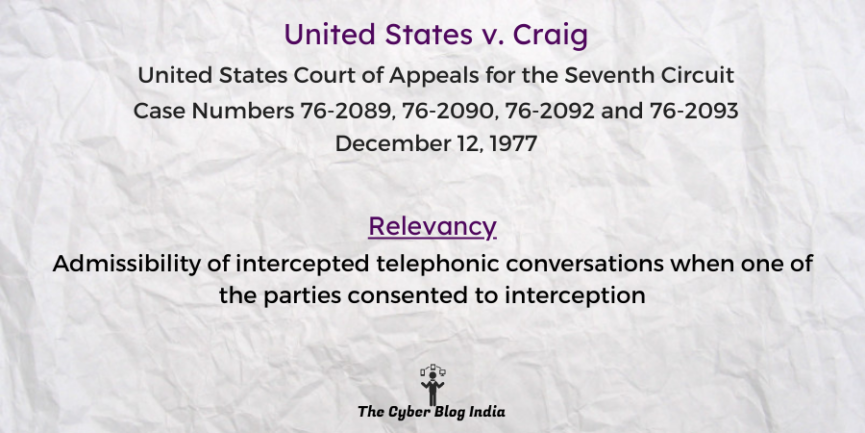United States v. Craig

United States v. Craig
573 F.2d 455
In the United States Court of Appeals for the Seventh Circuit
Case Numbers 76-2089, 76-2090, 76-2092 and 76-2093
Before Circuit Judge Swygert, Circuit Judge Cummings and Senior District Judge Campbell
Decided on December 12, 1977
Relevancy of the case: Admissibility of intercepted telephonic conversations when one of the parties consented to interception
Statutes and Provisions Involved
- The Federal Wiretapping Act, 18 USC § 2511
- Frauds and swindles, 18 USC § 1341
- Interference with commerce by threats or violence, 18 USC § 1951
- Fraud and false statements, 26 USC § 7206(1)
Relevant Facts of the Case
- The Northern Illinois Ready-Mix and Materials Association (NIRMMA) desired new legislation for highway weight relief for cement trucks, and to ensure the Bill’s passing, the cement industry was willing to bribe Congress members.
- One of the present appellants also travelled interstate to ensure bribe collection.
- The cement industry members also exchanged emails with Congress about coercing the Governor to assent to the Bill. However, the Governor vetoed the Bill, and the industry refused to pay their dues. They agreed to a compromise, and the money was sent to Congress.
- A governmental investigation had some defendants pleading guilty and cooperating with the police by recording telephone conversations with other Congress members about the bribe payments.
- The trial court and the jury found the defendants guilty on fourteen counts of conspiracy, fraud, bribery, and travelling interstate for criminal purposes, among others.
Prominent Arguments by the Counsels
- The appellants’ counsel argued that they did not consent to the recording and their interception, violating their Fourth, Fifth and Sixth Amendment rights. Further, by recording, the defendants were not acting in the colour of the law.
- The appellee’s counsel submitted that there was an elaborate scheme to defraud the citizens of Illinois and its honest legislators. Further, the recorded conversations are admissible as one of the parties consented.
Opinion of the Bench
- Majority: The jury correctly identified all counts of mail fraud and recorded conversations. Further, travelling interstate to ensure bribe collection was an offence, rejecting all submissions made by the appellants.
- Minority: Although the crimes were severe, they did not violate the federal mail or travel statute. The statutes were meant to be interpreted literally, not liberally. Moreover, the State did not prove the appellants’ offences beyond a reasonable doubt.
Final Decision
- The court affirmed the trial court’s conviction judgment with a majority.
Nikita D’Lima, an undergraduate student at NMIMS School of Law, Navi Mumbai, prepared this case summary during her internship with The Cyber Blog India in May/June 2023.
